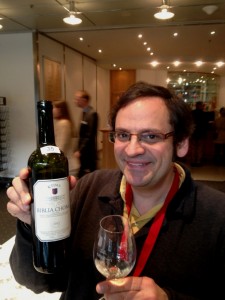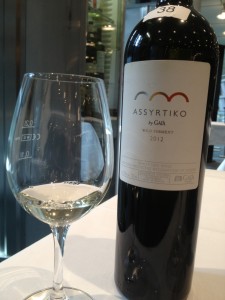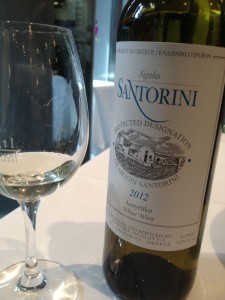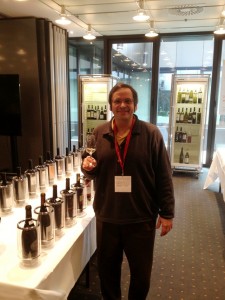Starting with the Greeks at ProWein
March 24, 2013
Just arrived at ProWein in Düsseldorf on a cold and windy Sunday 24 March. And am trying Greek wine!
According to a press release here, “experts agree that Greek wine never was as good as it is now.” Having tasted some Greek wines in recent years – also in Washington D.C. from importers – I would agree. Not that I am a Greek wine specialist. Far from it. But I am sipping on a lovely Assirtiko made from 80 year old vines.
It seems that the winemaker chose to age the wine in some new oak, which seems just a bit over prevalent, but the color is a youthful straw as it is a 2012 wine, so no sign of any premature oxidation. Assyrtiko is a famous white grape. The aroma is herbal and flower stem like. There is a certain thickness to the wine that is not displeasing. But perhaps the oak comes too much to the fore.
Anyway, Greek wines deserve every due. Especially in this economy, am I right? Of course! And is that not so very nice to see that in the press room of this massive wine fair, journalists and trade writers are exposed to Greek wines. I also tried another Assyrtiko from the well established producer Sigalas, which is in some ways less “impressive” than the Gaia, but I like its more direct fruit sans the oak treatment.
Most professionals know that the days when Greek gastronomy – you know, that healthy stuff like fresh fish, vegetables, olive oils, seafood, lemon and spices – that makes certain islanders live the longest lives worldwide – was dominated by cheap Retsina table wines are long gone. Although I have a soft spot for Retsina! Give me Retsina and Moussaka any day. But I digress. In fact, too far. Because although I tasted some duds, such as a medicinal Moschofilero, another indigeous Greek grape, to a dull Blanc de Noirs (not sure which red grapes were used), I also tasted my favorite wine of the few I sampled: the Biblia Chora 2012blend of Assyrtiko and Sauvignon Blanc. This wine (photo up top) has citrus on the nose, with a bit of Sauvignon plant aromas but never green, a brisk attack and a pleasant and smooth mouth feel that never loses its energy. My goodness, it gives Sancerre an easy run for its money.
I liked this wine so much, so here some history: The wine was established in 2001 by two well known winemakers, Vassilis Tsaktsarlis and Vangelis Gerovassiliou. The two combined their love for wine and their experience in creating good quality wines to develop a “model organic vineyard” of 35 hectares at the foot of Mount Pageo in Kokkinochori, Kavala. The area has a long history of grape-growing and winemaking. In antiquity, a grape variety known as “Biblia Ambelos” was cultivated here for wine production and the region has been named “Biblia Chora” for this reason.
I could see myself now, on a Greek island, enjoying dolmades and then freshly grilled octopus, and drinking this wine. Beam me up Scotty. Now.
So, long story short: the quality of Greek wines has improved significantly in the last 20 years, with names like Chateau Carras, Lazaridi, Hatzmichalis, Gerovassiliou and Sigalas pioneering change towards internationally competitive wines, with many others having followed their lead. And also the big names in the sector such as Tsantali, Boutari, Kourtaki and Achaia Clauss are now producing high quality wines in addition to the mass market versions.
More from ProWein coming soon! Stay tuned…




